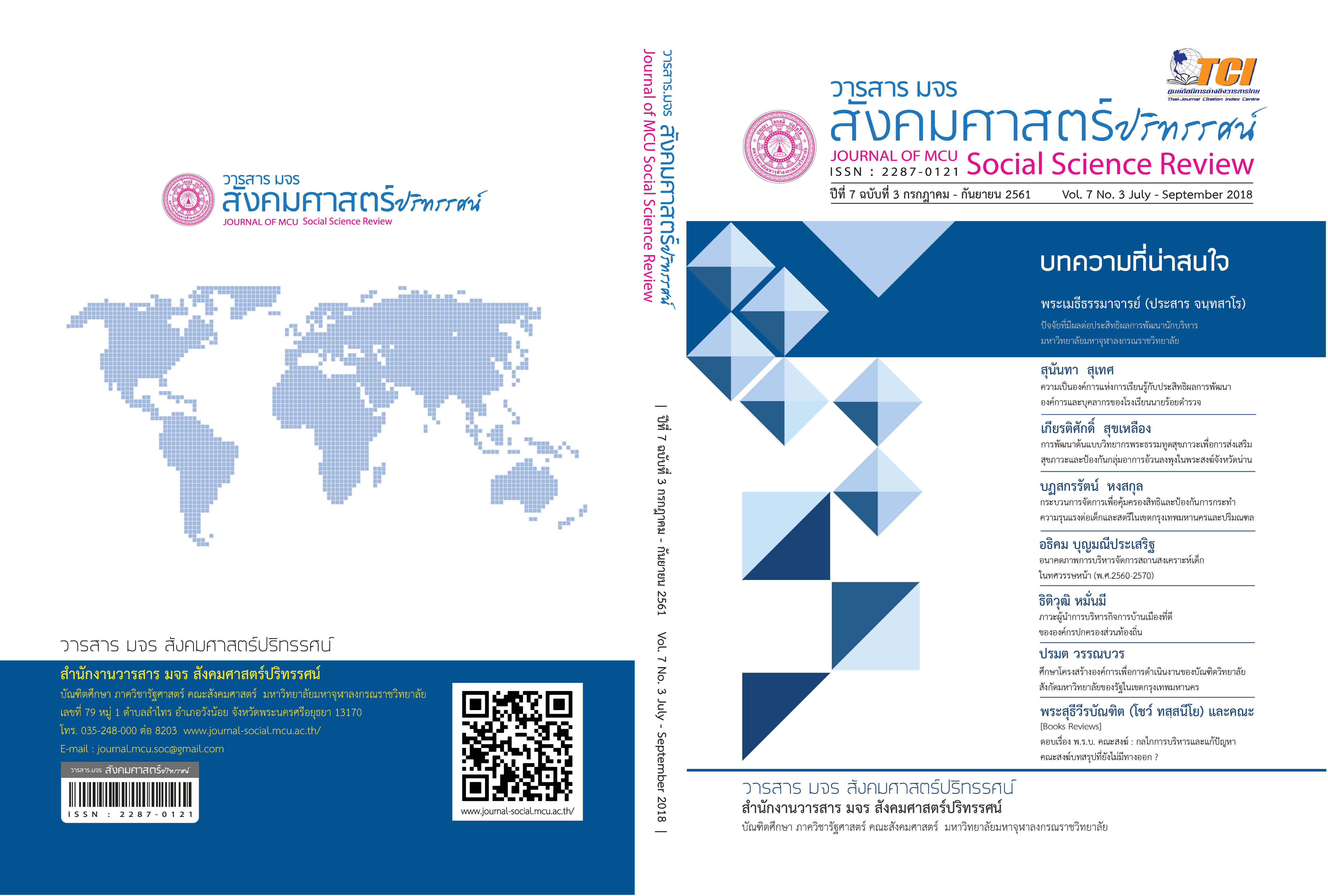ประสิทธิผลของสหกิจศึกษา : กรณีศึกษา อุดมศึกษาไทย
คำสำคัญ:
ประสิทธิผลของสหกิจศึกษา, สหกิจศึกษา, อุดมศึกษาไทยบทคัดย่อ
บทความวิจัยนี้มีวัตถุประสงค์ 1) เพื่อศึกษาวิธีการวัดประสิทธิผลของสหกิจศึกษาใน
ระดับอุดมศึกษาของประเทศไทย 2) เพื่อศึกษาปัจจัยสาคัญที่ส่งผลต่อประสิทธิผลของสหกิจศึกษา
ในระดับอุดมศึกษาของประเทศไทย
วิธีการวิจัยเป็นการวิจัยเชิงคุณภาพ โดยใช้การศึกษาวิจัยจากเอกสาร การสัมภาษณ์แบบ
เจาะลึก และการสังเกตแบบไม่มีส่วนร่วมของผู้วิจัย ซึ่งมีกลุ่มตัวอย่าง คือ ผู้บริหารมหาวิทยาลัย
อาจารย์นิเทศสหกิจศึกษา นักศึกษา จากมหาวิทยาลัย จานวน 3 แห่ง ได้แก่ มหาวิทยาลัย
เทคโนโลยีสุรนารี (มทส.) มหาวิทยาลัยวลัยลักษณ์ และมหาวิทยาลัยเทคโนโลยีราชมงคลธัญบุรี
และกลุ่มตัวอย่างจาก ผู้บริหารสถานประกอบการ และพี่เลี้ยงนักศึกษาสหกิจศึกษา จากสถาน
ประกอบการทั้ง 3 แห่ง ได้แก่ บริษัท เวสเทิร์น ดิจิตอล (ประเทศไทย) บริษัท เบทาโกร จากัด
(มหาชน) บริษัท ไมโครชิพ เทคโนโลยี (ไทยแลนด์) จากัด (ซึ่งทั้ง 3 บริษัทเป็นสถานประกอบการที่
ดาเนินสหกิจศึกษาที่เกี่ยวข้องกับมหาวิทยาลัยทั้ง 3 แห่ง) จานวนทั้งสิ้น 40 คน
ผลการวิจัย พบว่า
มหาวิทยาลัยทั้ง 3 แห่ง ได้แก่ มหาวิทยาลัยเทคโนโลยีสุรนารี (มทส.) มหาวิทยาลัยวลัย
ลักษณ์ และมหาวิทยาลัยเทคโนโลยีราชมงคลธัญบุรี การศึกษาประสิทธิผลของสหกิจศึกษา ของ
มหาวิทยาลัยทั้ง 3 แห่ง พบว่า มหาวิทยาลัยทั้ง 3 แห่ง ประสิทธิผลของสหกิจศึกษาที่เกิดขึ้น ในด้าน
คุณภาพของนักศึกษา สามารถวัดได้จาก ประสบการณ์ในการทางานของนักศึกษา ทักษะต่างๆใน
การทางานของนักศึกษาเมื่อออกฝึกสหกิจศึกษา ในด้านคุณภาพของมหาวิทยาลัย สามารถวัดได้
จากอาจารย์ที่มีคุณภาพ หลักสูตรที่ได้รับการปรับปรุงและมีคุณภาพ มีการจัดการดาเนินสหกิจ
ศึกษาที่ดี มีการประสานการดาเนินสหกิจศึกษาระหว่างอาจารย์นิเทศสหกิจศึกษา และพี่เลี้ยง
นักศึกษาสหกิจศึกษา มีการแลกเปลี่ยนประสบการณ์เรียนรู้ระหว่างมหาวิทยาลัยและสถาน
ประกอบการ และด้านคุณภาพของสถานประกอบการ สามารถวัดได้จากมีการกระบวนการคัดเลือก
นักศึกษาที่เข้ามาฝึกสหกิจศึกษาอย่างมีคุณภาพ ขนาดของสถานประกอบการและระยะเวลาใน
การจัดฝึกสหกิจศึกษาของสถานประกอบการ และงบประมาณในการดาเนินสหกิจศึกษาของสถาน
ประกอบการ
การศึกษาปัจจัยที่ส่งผลต่อประสิทธิผลของสหกิจศึกษาของมหาวิทยาลัยทั้ง 3 แห่ง พบว่า
ปัจจัยด้านการเงิน ด้านสถาบัน และด้านผู้นา มีผลที่ก่อให้เกิดประสิทธิผลของสหกิจศึกษาของ
มหาวิทยาลัยทั้ง 3 แห่ง
ดาวน์โหลด
เผยแพร่แล้ว
รูปแบบการอ้างอิง
ฉบับ
ประเภทบทความ
สัญญาอนุญาต
ลิขสิทธิ์ (c) 2018 วารสาร มจร สังคมศาสตร์ปริทรรศน์

อนุญาตภายใต้เงื่อนไข Creative Commons Attribution-NonCommercial-NoDerivatives 4.0 International License.
เพื่อให้เป็นไปตามกฎหมายลิขสิทธิ์ ผู้นิพนธ์ทุกท่านต้องลงลายมือชื่อในแบบฟอร์มใบมอบลิขสิทธิ์บทความให้แก่วารสารฯ พร้อมกับบทความต้นฉบับที่ได้แก้ไขครั้งสุดท้าย นอกจากนี้ ผู้นิพนธ์ทุกท่านต้องยืนยันว่าบทความต้นฉบับที่ส่งมาตีพิมพ์นั้น ได้ส่งมาตีพิมพ์เฉพาะในวารสาร มจร สังคมศาสตร์ปริทรรศน์ เพียงแห่งเดียวเท่านั้น หากมีการใช้ภาพหรือตารางหรือเนื้อหาอื่นๆ ของผู้นิพนธ์อื่นที่ปรากฏในสิ่งตีพิมพ์อื่นมาแล้ว ผู้นิพนธ์ต้องขออนุญาตเจ้าของลิขสิทธิ์ก่อน พร้อมทั้งแสดงหนังสือที่ได้รับการยินยอมต่อบรรณาธิการ ก่อนที่บทความจะได้รับการตีพิมพ์ หากไม่เป็นไปตามข้อกำหนดเบื้องต้น ทางวารสารจะถอดบทความของท่านออกโดยไม่มีข้อยกเว้นใดๆ ทั้งสิ้น





